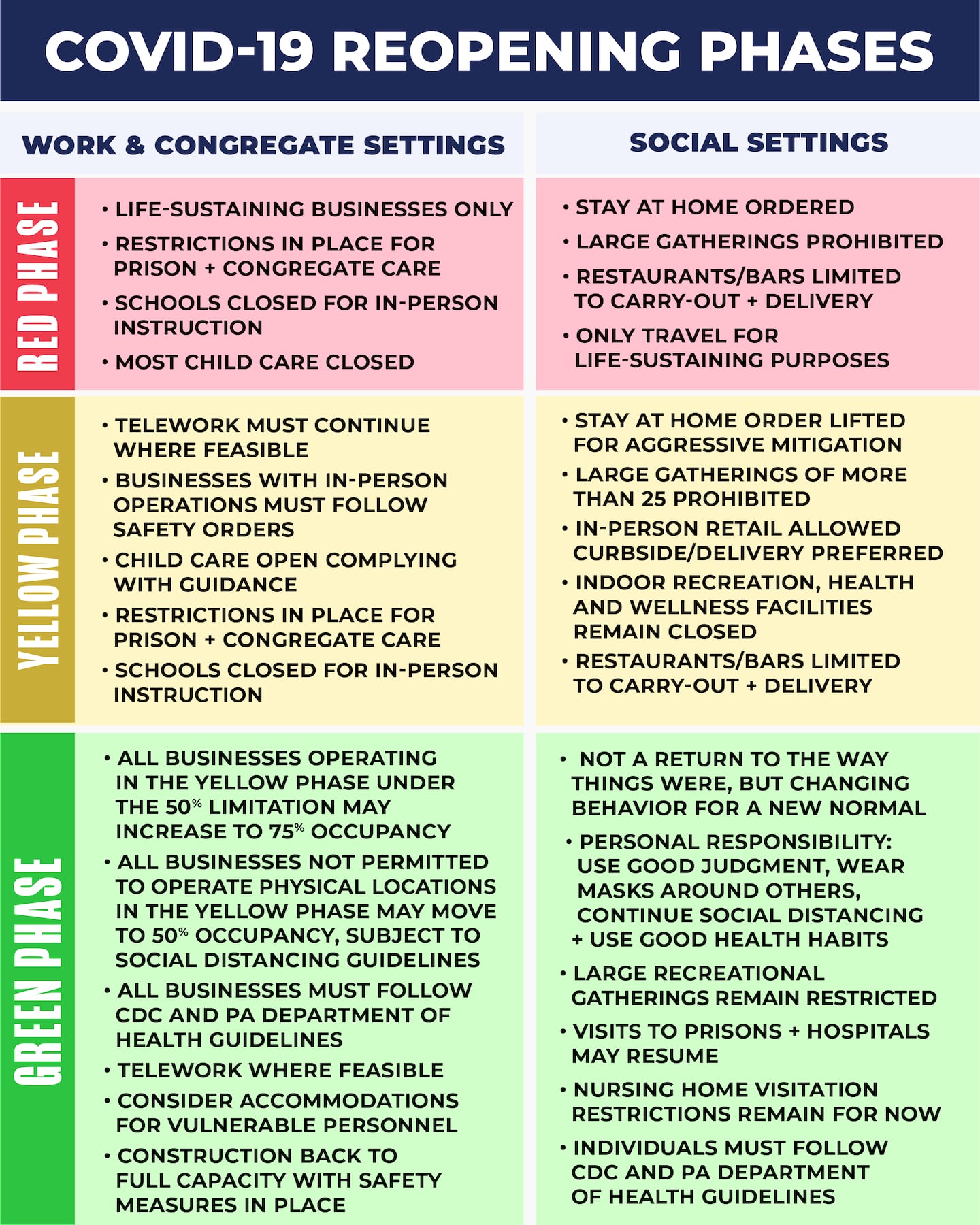Gov. Tom Wolf announced that 16 counties in western and central Pennsylvania, including much of the Pittsburgh area, will move into the green phase on June 5.
Those counties include: Allegheny, Armstrong, Bedford, Blair, Butler, Cambria, Clinton, Fayette, Fulton, Greene, Indiana, Lycoming, Mercer, Somerset, Washington and Westmoreland counties.
They will join 17 Pennsylvania counties that moved into the green phase on Friday, May 29.
Wolf said since May 8, the daily amount of lab tests has dramatically increased and Pennsylvania is seeing a drop in COVID-19 cases compared to many other states. He said the ability to identify and isolate cases has also increased.
- Pennsylvania Coronavirus Map: See the number of cases in each county, zip code
- Reopening Pennsylvania: What you can expect when counties move to yellow phase
What does moving to the green phase mean?
Under the green phase, restaurants and bars, hair salons, barbershops, gyms, spas, wellness facilities, casinos, theaters and shopping malls are all allowed to open, but they must limit occupancy to 50%. Centers for Disease Control and Prevention guidelines must continue to be followed.
Pennsylvania Secretary of Health Dr. Rachel Levine said people will still need to wear masks and still be vigilant to potential spread.
Here is more from Wolf’s reopening plan:
On May 27, Wolf elaborated on the green phase guidelines by issuing an updated order for counties in the green phase of reopening.
The order from Governor Tom Wolf and Secretary of Health Dr. Rachel Levine included these provisions:
- Suspended all previous stay-at-home orders and replaced them with the new green phase order for the affected counties.
- The order included provisions for businesses that were permitted to conduct in-person operations in the yellow phase, those permitted to operate with some restrictions on in-person operations and those that were not permitted any in-person operations under the yellow phase.
- The order also included guidance on occupancy limits and health and safety orders that business must adhere to under the green phase.
Specifics are included on those areas that have raised questions from business owners and residents, including:
- Personal care services, including hair salons and barber shops must operate by appointment only; appointments or reservations are also strongly encouraged for gyms or spas.
- Any gathering for a planned or spontaneous event of greater than 250 individuals is prohibited. This includes, but is not limited to, a concert, festival, fair, conference, sporting event, movie showing, or theater performance.
- Churches, synagogues, temples, mosques and other places of congregate worship are specifically excluded from the limitations established by the order. These institutions are strongly encouraged to enforce social distancing and other mitigation measures such as masking at their gatherings.
- Visitation to prisons and hospitals may resume subject to the discretion of the facility. Visitors who interact with residents and patients must be diligent regarding hygiene. Given the critical importance of limiting COVID-19 exposure in nursing homes, nursing home visitation restrictions will initially remain in place.
Restaurant guidelines for green phase
Retail food service businesses, including restaurants, and bars located in counties designated as being in the green phase are permitted to provide take-out and delivery sales, as well as dine-in service in both indoor and outdoor seating areas, so long as they strictly adhere to the requirements of the guidance, including maximum occupancy limits:
- Bar seating may be utilized if customers are seated and comply with physical distancing guideline of at least 6 feet or physical barriers between customers. Standing in a bar area will not be permitted.
- A maximum of four customers that have a common relationship may sit together at the bar, while adhering to the physical distancing guidelines or barriers between other customers.
As we reopen our commonwealth, we're also reopening restaurants and bars.
— Governor Tom Wolf (@GovernorTomWolf) May 27, 2020
🔴 Red phase: Carry-out and delivery only
🟡 Yellow phase: Outdoor dining permitted (effective 6/5)
🟢 Green phase: Indoor dining permitted with safety guidance in place
More: https://t.co/1PtuOSDTuM pic.twitter.com/5wR64mC4HM
© 2020 Cox Media Group









